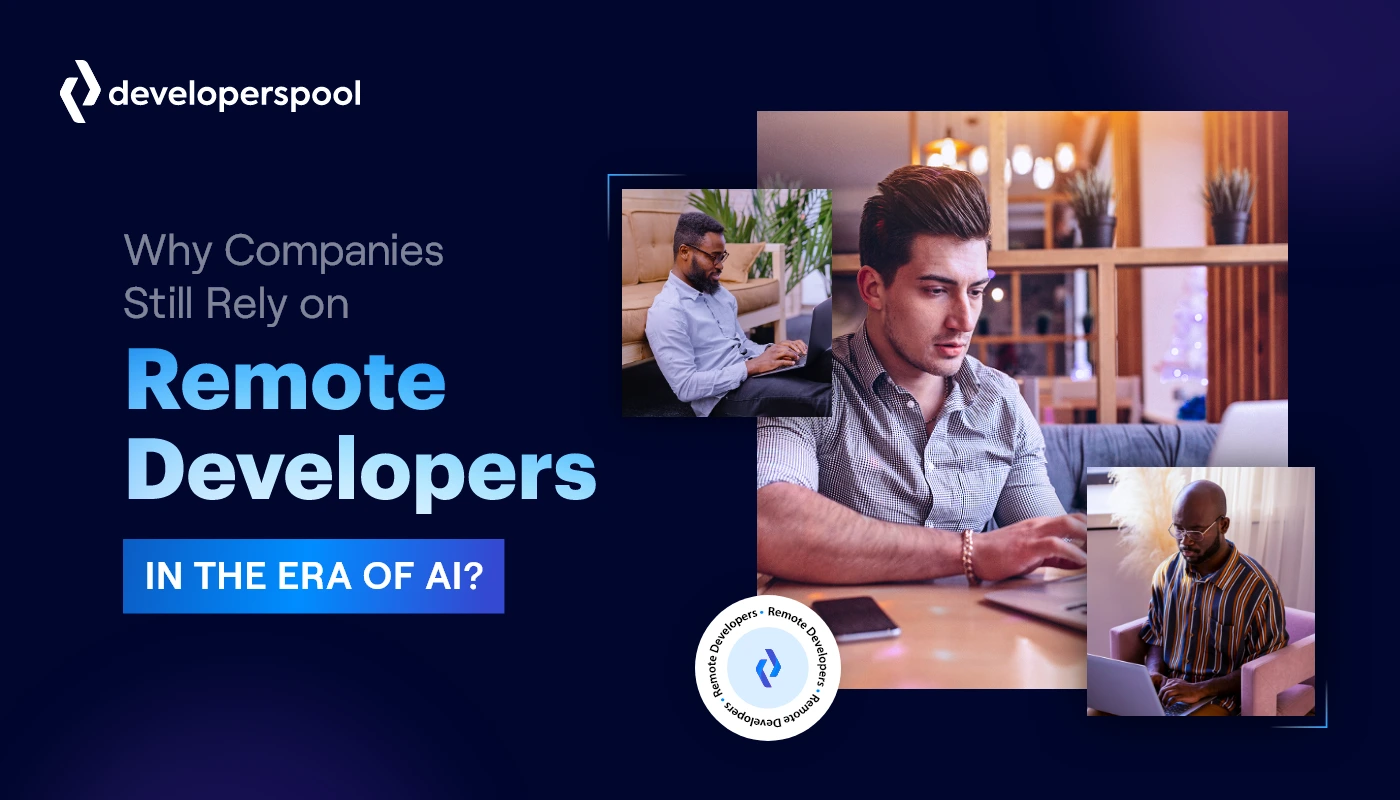Top AI Agents & Autonomous App Developers to Watch in 2025
- July 8, 2025
- 15 mins
- 8.4k

2025 is not just another chapter in the story of AI. It’s a turning point. Chatbots and rule-based automation are a thing of the past. Today’s Large Language Models (LLMs) have evolved into powerful digital laborers, thinking, strategizing, and completing tasks entirely on their own. And apps? They’re also becoming more intelligent, morphing into autonomous systems that can adapt in real time, optimize processes, manage workflows without human hand-holding, and run at true industrial scale.
“Agentic AI” is now in the spotlight across all segments, from hyper-growth startups to established multinationals. Businesses don’t want basic tools anymore. They want smart autonomous app developers who can establish self-learning, self-operating systems to work at the speed, scale, and innovation that is required.
In this post, we’re taking a deep dive into the emergence of AI agents and autonomous apps, and showcasing 10 standout companies shaping the fabric of the future of intelligent software in 2025.
What Are AI Agents and Autonomous Applications?
AI Agents are digital entities designed to understand objectives, plan solutions, and autonomously act upon them. Unlike traditional bots that follow predefined scripts, AI agents use reasoning, memory, and multi-step task execution to get things done—often across multiple platforms, tools, and data sources.
Autonomous Applications, on the other hand, are smart systems that operate without constant human oversight. They adapt, learn from interactions, and optimize outcomes over time—think of them as apps with a brain.
These technologies are no longer experimental. You’ll find them:
- In healthcare, scheduling patient visits, analyzing diagnostics, and assisting in clinical documentation
- In logistics, planning routes, reallocating resources, and optimizing last-mile deliveries
- In SaaS, acting as co-pilots for tasks like onboarding, customer support, and analytics
- In finance, reconciling transactions, detecting fraud, and generating smart reports
The takeaway? AI agents and autonomous systems aren’t coming—they’re already here, and they’re reshaping software architecture as we know it.
Key Features of a Leading AI Agent or Autonomous App Development Company
As you decide who you want to work with and who your AI agency partner will be, it’s critical to understand the difference between a good agency and a great agency. The following are the characteristic behaviors that distinguish top AI agent and autonomous app developers whether in architecture, integration, security, or domain expertise.
LLM Expertise and Integration Experience
The top developers here can create a very customized base model such as GPT-4, Claude, Gemini and even fine-tuned open-source substitutes. They understand how to utilize embeddings, retrieval-augmented generation (RAG), and agentic logic to build smart flows.
Multi-Agent Architecture
The capacity to direct multiple agents each with a memory, role and specialized toolsare essential. This is how programmers today construct workflows that reflect human collaboration and enable the coordination of tasks.
Contextual Memory and API Chaining
Memory is more than just recall. It’s about creating a user-centric understanding that is maintained over time and provides a frame of reference for the conversation. Today developers create agents that you can connect to an API, a database or a third-party platform in a contextual manner.
Security, Scalability & Cloud Capable
Leading teams use secure, enterprise-grade Azure OpenAI to AWS Bedrock architectures with scalable data processing and encrypted data processing and real-time monitoring.
Cross-Industry Proficiency
Whether it’s law, fintech, ecommerce or healthcare domain, virtuosity is important. The most talented developers marry tech skills with industry insight to customize autonomous systems that actually function in the real world.
Top AI Agent & Autonomous App Developers to Watch in 2025
From autonomous copilots to workflow agents, these standout companies are shaping the future of intelligent automation. Explore their core services, industries served, and what makes each one a strategic choice for building AI agents and LLM-powered autonomous applications.
1.Cognition Labs
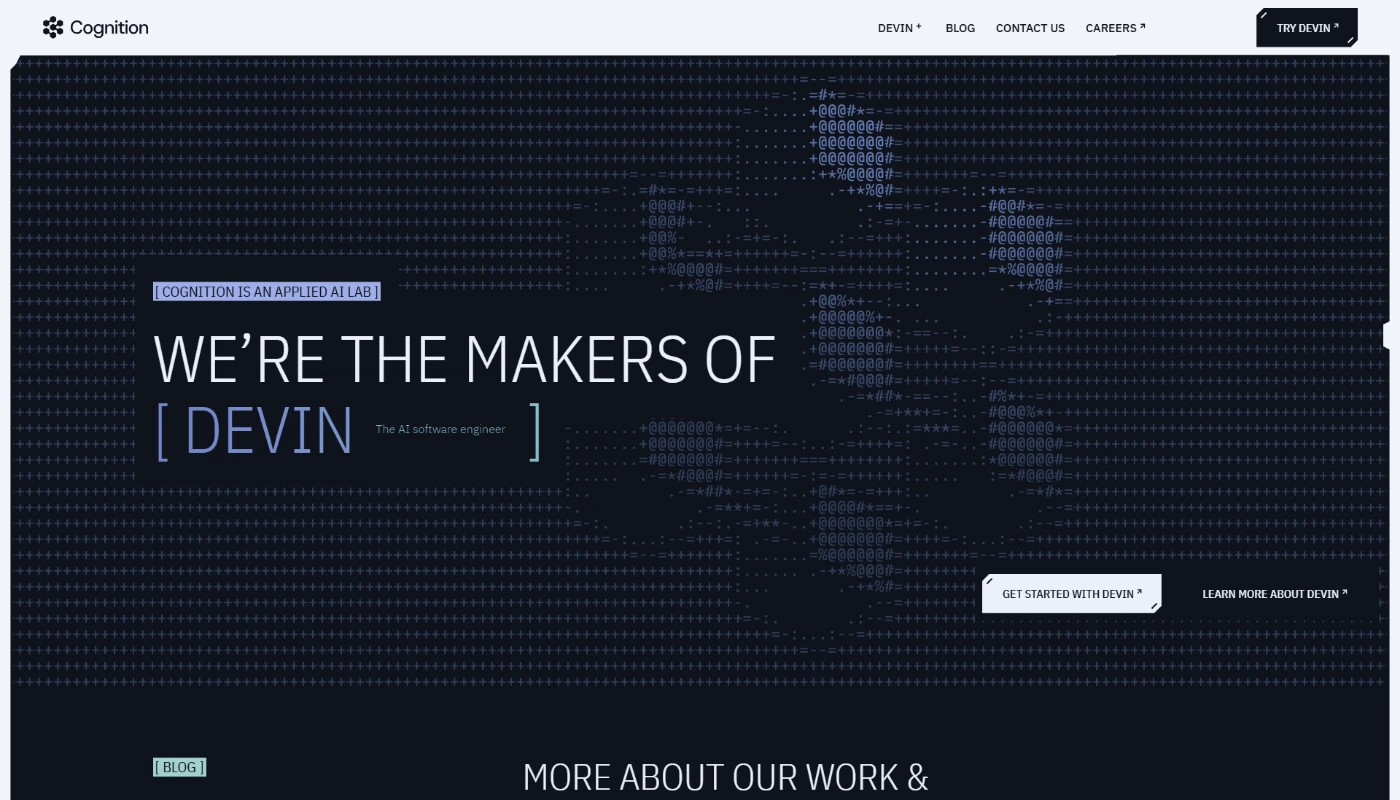
Overview:
Cognition Labs has made headlines by developing Devin, the first AI software engineer capable of writing, debugging, and deploying code autonomously. With roots in OpenAI and a mission to reimagine developer productivity, Cognition Labs builds systems that allow businesses to automate full software lifecycles.
Devin uses reasoning, tool usage, memory, and context chaining to execute complex development tasks—reducing the need for human coders. This innovation opens the door to AI-led app development, particularly for startups and software firms that require fast iterations and lean engineering.
Why They’re Disrupting DevOps:
Their ability to replace entire segments of the software engineering process puts them at the center of AI-first product evolution.
Core Services:
- Autonomous coding agents (Devin)
- AI software engineers for full-stack builds
- DevOps and CI/CD pipeline automation
- Natural language to code transformations
Use Cases / Notable Industries:
- Developer tooling and infrastructure
- SaaS startups
- AI-first product companies
- Code review and debugging automation
- Agile DevOps teams
-
Fixie.ai
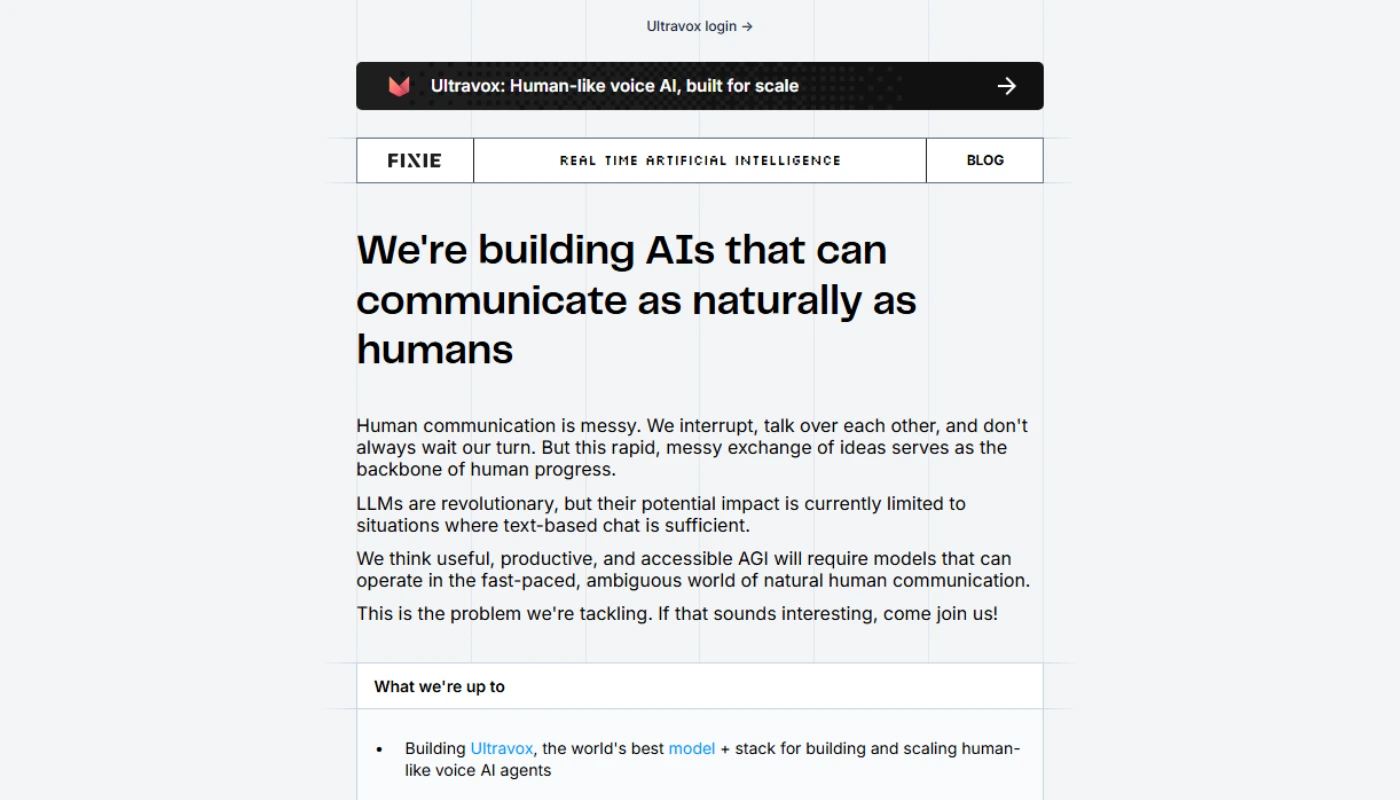
Overview:
Fixie.ai enables developers to deploy intelligent agents as code. Their infrastructure helps developers build modular AI workflows using APIs, tools, and business logic connectors. With native support for LLMs, embeddings, and prompt chaining, Fixie’s AgentOps platform makes it easy to manage and scale agent behavior in production environments. Designed for observability, debugging, and flexibility, Fixie is perfect for startups and tech teams building internal tooling, agent copilots, and workflow automations.
Core Services:
- AgentOps platform for developer-built agents
- API-centric autonomous workflows
- LLM and embedding integration
- Observability and versioning tools for agents
Use Cases / Notable Industries:
- Internal enterprise tooling
- Agent copilots for engineering teams
- Automation for support, IT ops, and DevOps
- Custom business logic agents for SMBs and startups
Why They Empower Tech Teams:
Fixie makes agents manageable like microservices—versioned, observable, and customizable at scale.
-
Adept AI
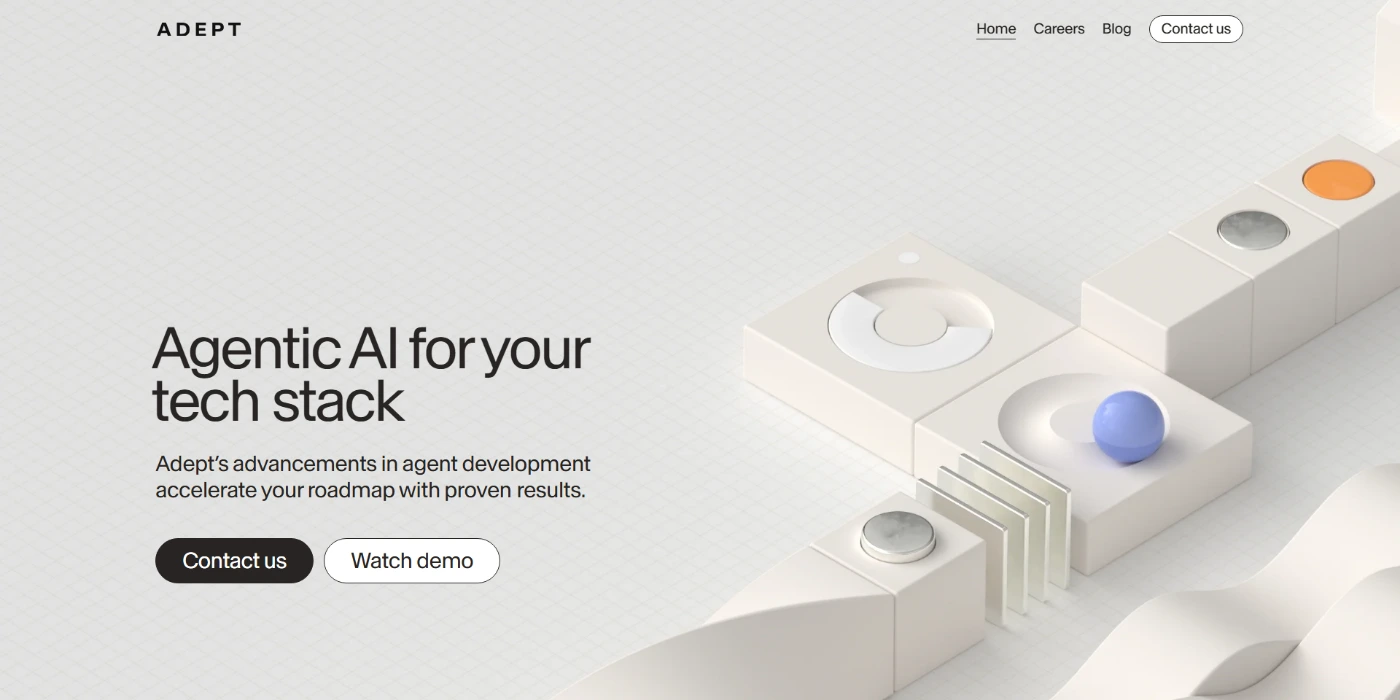
Overview:
Adept is focused on building AI agents that use existing tools like humans. Their agents don’t just analyze data—they click buttons, enter data, and navigate user interfaces to get work done. This approach enables companies to layer AI onto legacy systems without needing to replace them. Adept’s unique blend of vision, language understanding, and action prediction allows it to function across CRMs, ERPs, spreadsheets, and more.
Core Services:
- Tool-using agents for GUI-based software
- Vision + language modeling for UI interaction
- Custom agents for legacy tool integration
- Low-code automation layer for business systems
Use Cases / Notable Industries:
- ERP, CRM, and spreadsheet automation
- Customer service ops
- Back-office automation for enterprises
- Digital transformation across traditional industries
Why Enterprises Trust Them:
Adept allows businesses to modernize workflows without rebuilding infrastructure—agents use existing software as a human would.
-
Codiant – A Yash Technologies Company
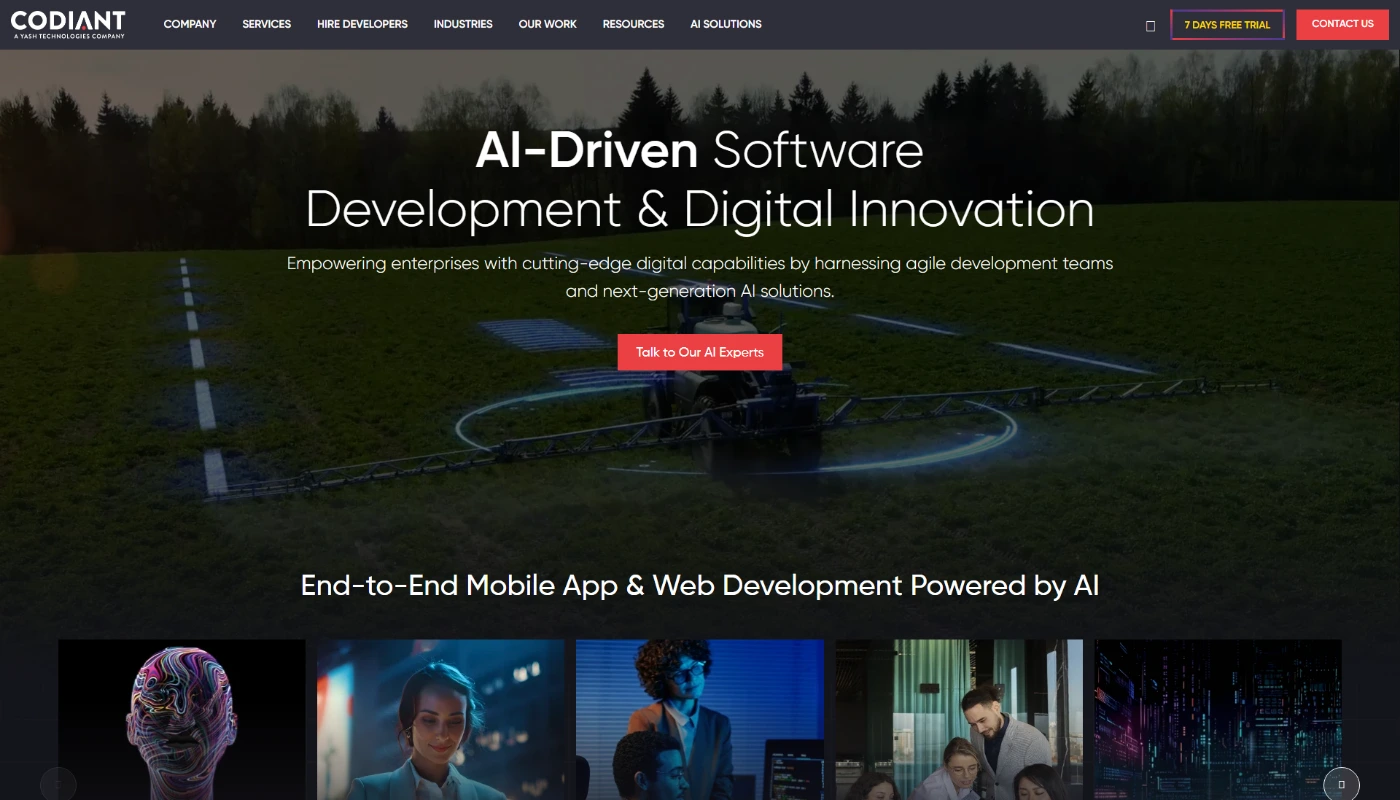
Overview:
Codiant is pioneering leader in bringing AI based digital transformation. By leveraging their vast experience in AI agents, NLP, computer vision, as well as full-stack applications, they are building smart solutions for real-time business applications.
Their AI agent designs usually include memory-reasoning, LLM orchestration, and API integration, so their designs are well-prepared to scale and to work at an enterprise-grade level. Codiant powered businesses all around the globe in varied industries whether Fintech, Healthcare, e-Commerce, on demand, Travel, Finance, Banking, Social Networking, Sports, Education, Crypto, Utility and more their Identity of Success with our technology strategies to deliver their next generation products.
Core Services:
- AI agent development
- Autonomous software and workflow automation
- LLM integration and fine-tuning
- NLP, Computer Vision, and RAG-based systems
- End-to-end AI product development
Use Cases / Notable Industries:
- Healthcare (clinical automation, patient triage)
- eCommerce (personalized shopping assistants)
- Logistics (fleet and delivery optimization)
- Fintech (AI-powered insights and fraud prevention)
- SaaS (intelligent user onboarding, chatbots)
Why They’re a Category Leader:
Codiant excels at designing AI systems that operate independently while preserving user intent, logic, and data security across cloud-native pipelines.
-
LangChain Development Agencies
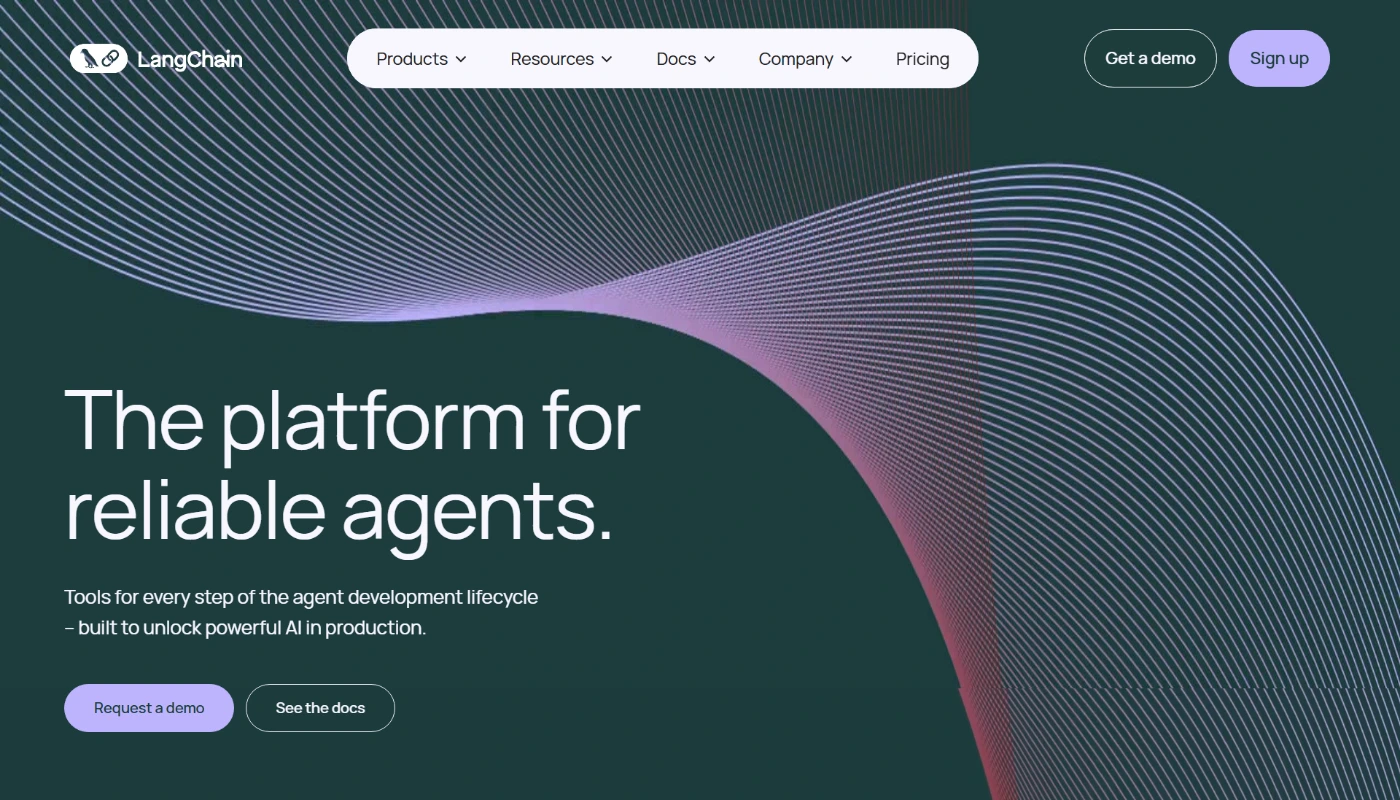
Overview:
LangChain development agencies use the most commonly-used frameworks to develop LLM-based applications. Increasingly, agencies focus on developing custom LangChain solutions and build standalone applications using long-term memory, retrieval-augmented generation and stepwise planning. These agents assist enterprises to develop smart assistants, legal writing analyzers, sales co-pilots, and multi-agent orchestration engines with open source foundations.
Core Services:
- Custom LangChain-based agent development
- Multi-agent orchestration and tool chaining
- Retrieval-Augmented Generation (RAG) workflows
- LLM integration and vector store optimization
Use Cases / Notable Industries:
- Legal tech (document analyzers, contract review)
- Financial services (analytical agents)
- EdTech (AI tutors, content summarizers)
- Sales & marketing (AI co-pilots, chat flows)
Why They Offer True Flexibility:
LangChain specialists can build agentic workflows from scratch, tailored to any domain, with transparent control over every logic layer.
-
Relevance AI
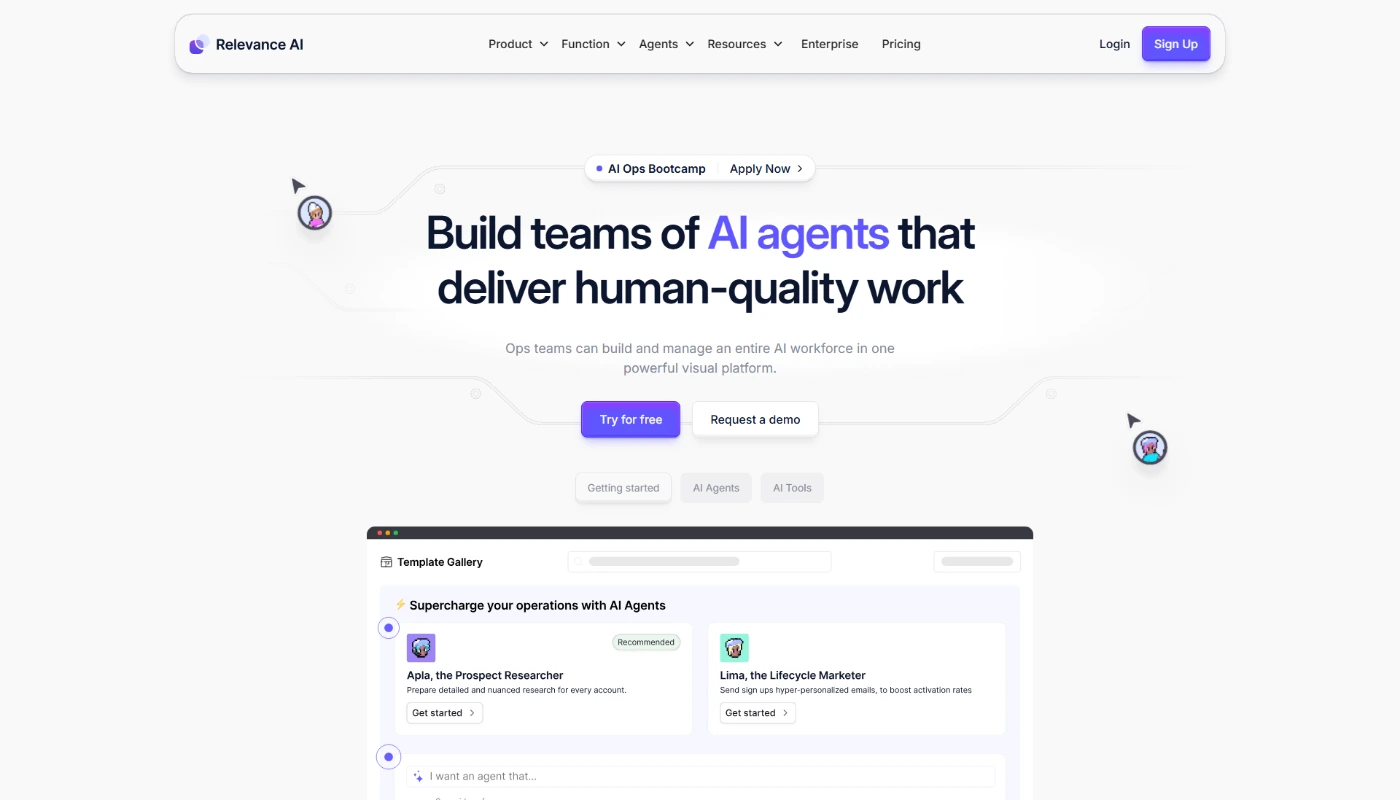
Overview:
Relevance AI enables non-technical teams to build and deploy agents through its intuitive no-code/low-code interface. Their platform supports multi-step logic, RAG pipelines, and LLM integrations, all managed through a visual dashboard. From automating customer feedback loops to building sales insight tools, Relevance helps businesses prototype and deploy fast. It’s especially useful for mid-sized businesses without in-house AI teams.
Core Services:
- No-code and low-code agent builders
- Visual agent orchestration dashboards
- Customer data analysis agents
- LLM pipelines with drag-and-drop interfaces
Use Cases / Notable Industries:
- Mid-sized retail and DTC brands
- Customer experience automation
- Sales ops and lead qualification
- Product analytics and internal dashboards
Why They’re Democratizing AI:
Relevance brings powerful agent technology to everyday business users—without code, just results.
-
Paralleldomain
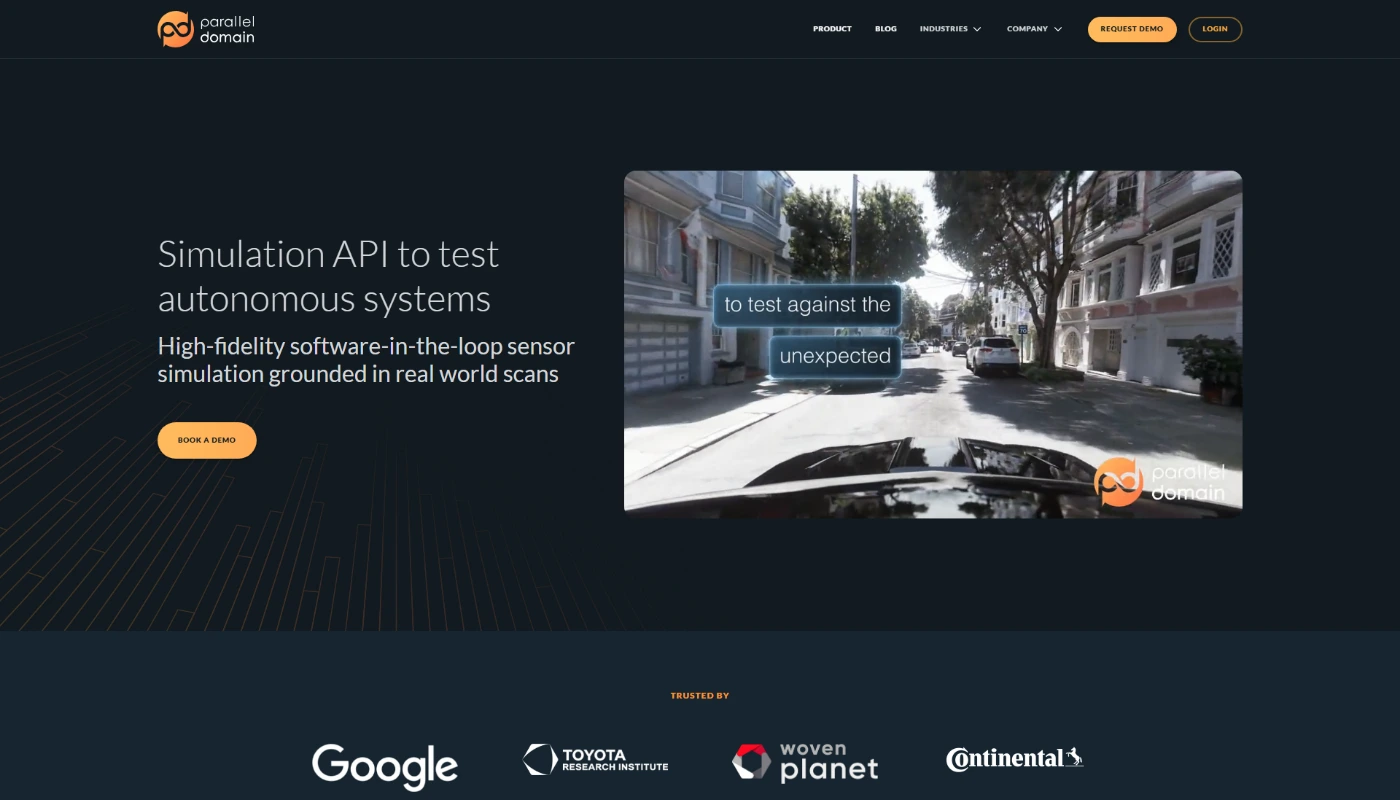
Overview:
Paralleldomain uses synthetic data to train AI agents that are going to be deployed in the real world — particularly in high-risk industries such as robotics and autonomous vehicles. Their virtual worlds (c.f., [2, 3]) model cities, pedestrians, vehicles, and even the sensors, as a part of the training of agents, enabling them to be prepared for anything. Providing edge-case testing and unlimited training examples, they help to mitigate the expense and risk of real-world prototyping.
Core Services:
- Synthetic data generation for AI training
- Simulation environments for autonomous agents
- Scene and scenario rendering for edge-case testing
- Data labeling, sensor simulation, and ground truth creation
Use Cases / Notable Industries:
- Autonomous vehicles (perception systems)
- Robotics (indoor/outdoor navigation agents)
- Smart cities and IoT simulations
- Industrial automation and drone AI testing
Why They’re Critical to AI Safety:
Their simulation-first approach ensures agents are resilient, accurate, and deployment-ready across dynamic physical environments.
-
Inworld AI
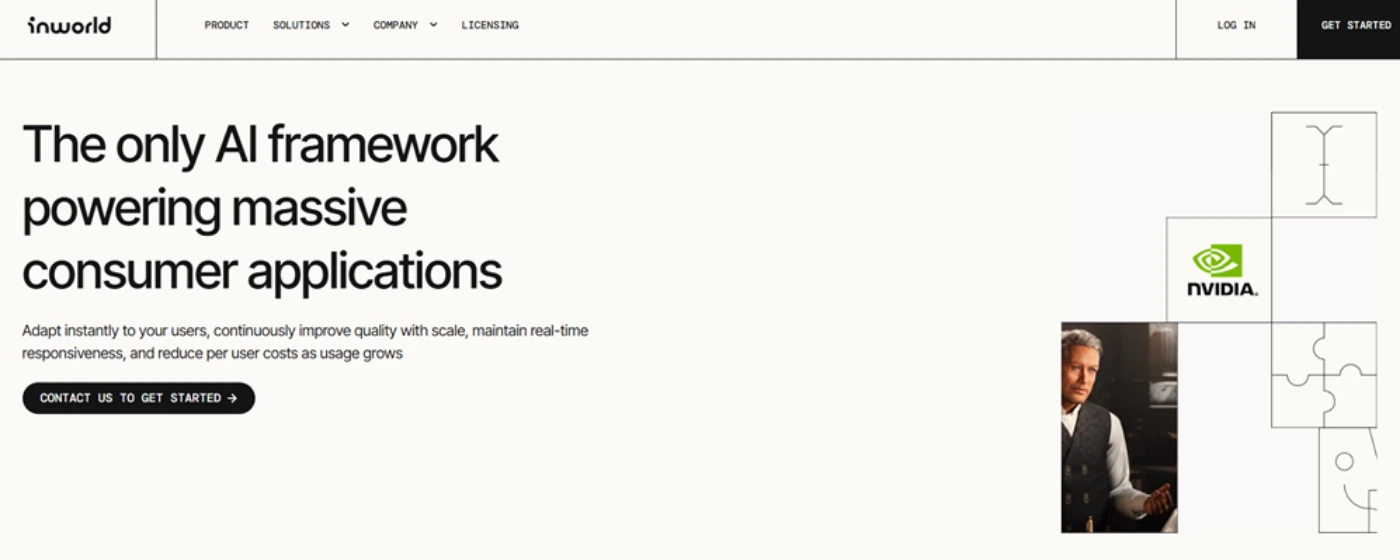
Overview:
Inworld AI builds character-driven agents capable of humanlike conversation, memory retention, and emotional intelligence. Their platform integrates with gaming engines and VR platforms to bring NPCs and training bots to life. Beyond entertainment, they’re also used in corporate simulations and L&D programs where realism and relatability matter. Developers can control personality, memory, and backstory to fine-tune interactions.
Core Services:
- Emotionally intelligent AI agents
- LLM-powered characters with memory and backstory
- Voice and chat-based NPC frameworks
- Multimodal integrations for Unity and Unreal Engine
Use Cases / Notable Industries:
- Gaming (NPC design and story interaction)
- Virtual reality training simulators
- Edutainment platforms and gamified learning
- Corporate L&D simulations and virtual coaching
Why They’re Leading Human-AI Engagement:
Inworld designs agents that feel alive—enabling next-gen training, storytelling, and experience design.
-
Neoteric
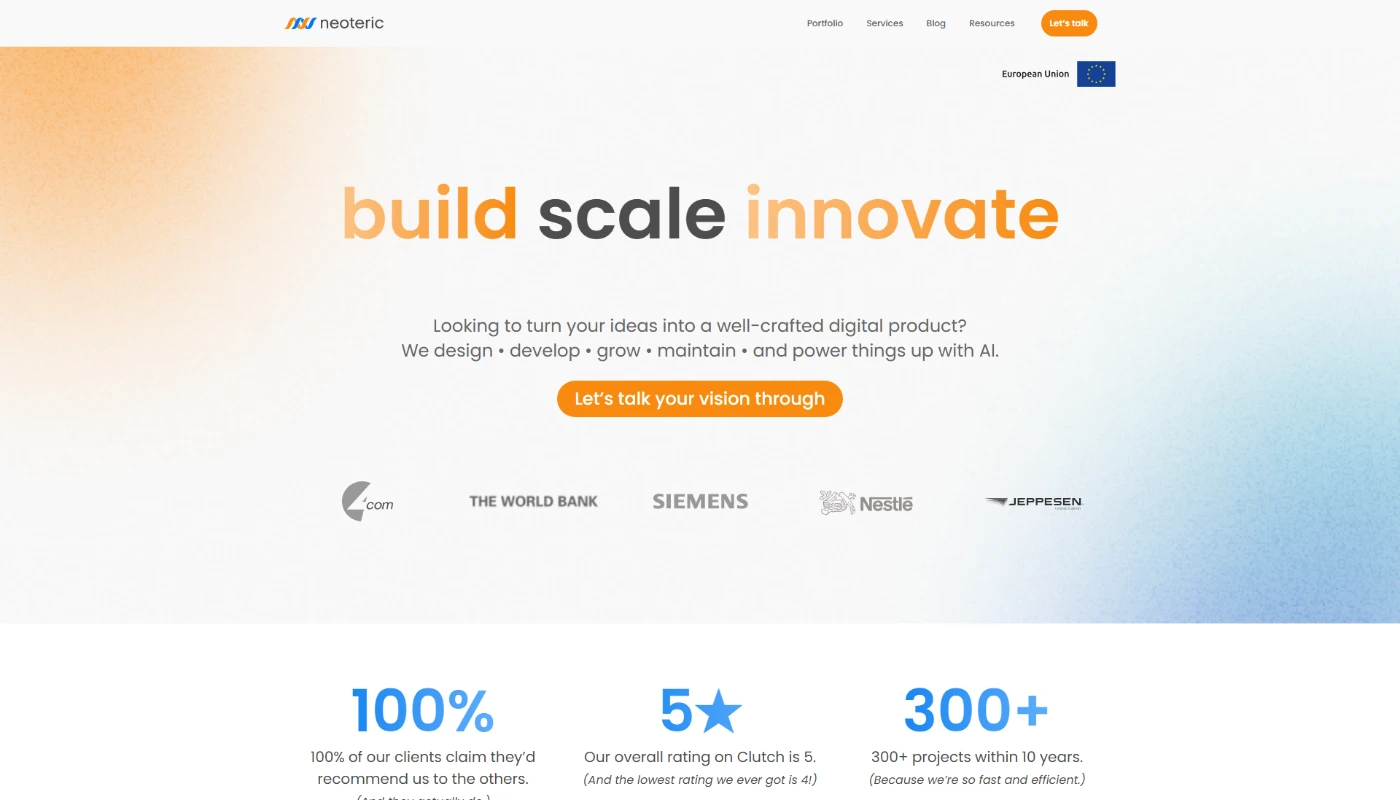
Overview:
Neoteric is a product engineering firm that builds AI-powered platforms with agentic capabilities. Known for working with early-stage and growth-stage startups, they offer tailored AI solutions like recommendation engines, predictive analytics tools, and autonomous business logic. Their agile process and deep analytics background allow them to convert vague ideas into measurable, AI-driven impact.
Core Services:
- AI product engineering
- Custom machine learning and agentic models
- Predictive analytics and business logic automation
- Agile MVP development with AI-first design
Use Cases / Notable Industries:
- Startups across SaaS, HR Tech, and eCommerce
- AI-based recommendation systems
- Demand forecasting and business optimization
- Productivity agents for SMB platforms
Why They Stand Out for Startups:
Neoteric builds smart systems that evolve fast—just like the businesses they serve.
-
Turing AI
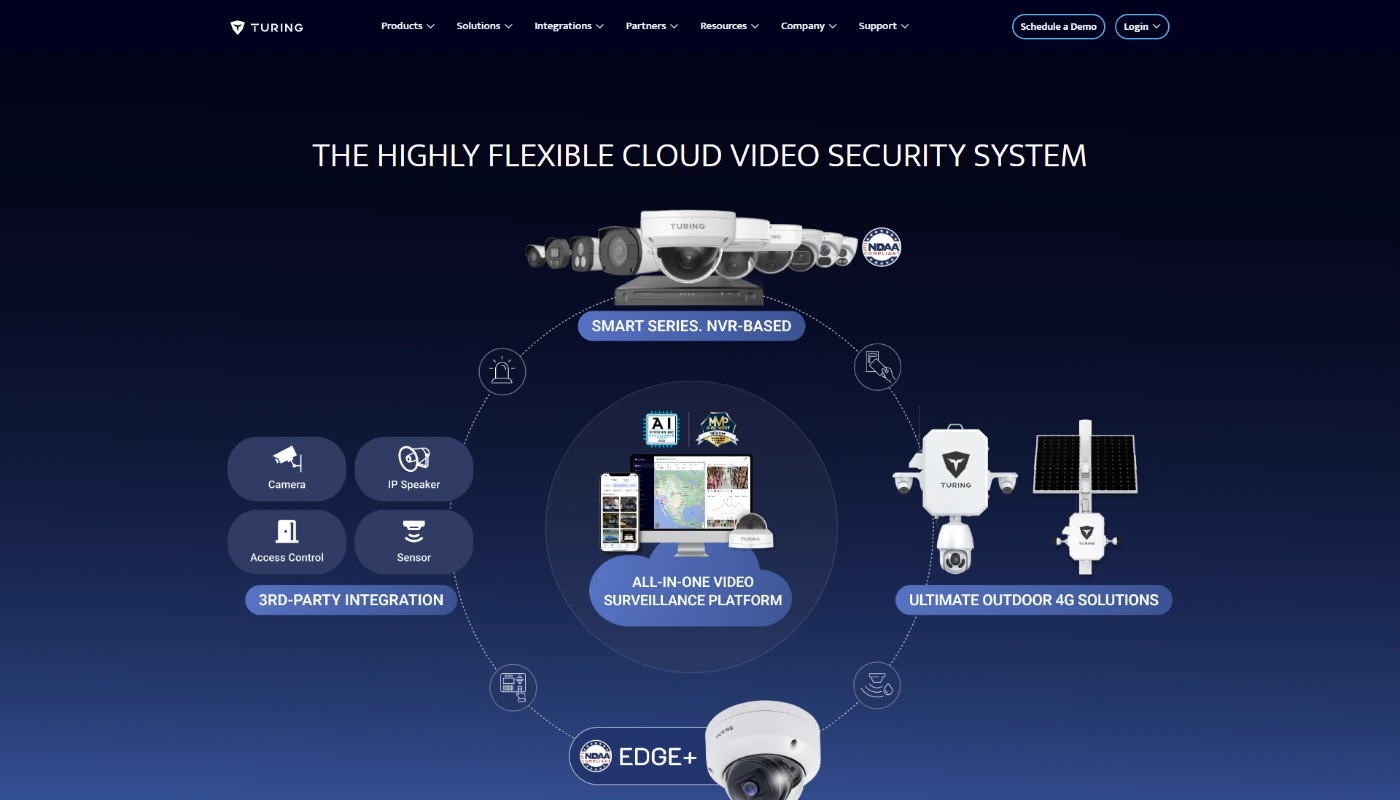
Overview:
Turing started as a talent network for elite developers but has evolved into an AI powerhouse offering managed AI development teams. Their engineers specialize in LLM integration, autonomous agent development, and AI product acceleration. By combining global talent access with structured project delivery, Turing is perfect for startups and enterprises needing agile builds with expert oversight.
Core Services:
- Managed AI engineering teams
- LLM and agent-based product builds
- On-demand AI specialists for startups
- Platform engineering with autonomous logic layers
Use Cases / Notable Industries:
- Startup MVPs needing fast AI integration
- Enterprise AI transformation
- Custom copilots and assistants
- Scalable LLM deployment for SaaS and Fintech
Why They Deliver at Scale:
Turing blends top-tier global talent with AI domain expertise to offer execution speed without compromising quality.
Final Thoughts
We’re no longer living in a world where apps sit idle waiting for clicks. The future is autonomous, intelligent, and agentic—and 2025 is proving to be the breakout year.
Whether you’re building a co-pilot for your team, an assistant for your customers, or a fully autonomous business logic engine—your choice of development partner will shape the outcome.
Invest in a company that not only understands LLMs and ML, but also the nuanced orchestration of memory, context, and decision-making. Because the next era of software isn’t coded line-by-line—it’s reasoned, planned, and executed by digital agents.
Frequently Asked Questions
AI agents act like digital workers. Unlike traditional apps that wait for commands, agents plan, learn, and act autonomously. They interact with tools and data in real time, making decisions without constant input—perfect for dynamic workflows that need adaptability and intelligence.
AI agents can replace repetitive tasks like scheduling, reporting, or customer queries. But they work best when augmenting humans—not replacing them. Strategic, creative, and interpersonal roles still need human input. A hybrid approach delivers the most value.
Industries like healthcare, logistics, finance, education, and retail gain the most. These sectors rely on repetitive, data-heavy workflows where agents boost speed, accuracy, and automation—supporting operations, analytics, personalization, and customer interaction.
When developed correctly, they’re highly secure. Top developers use encryption, access control, audit logs, and follow compliance like SOC 2 or GDPR. Cloud-native platforms add layers of protection. Risk is minimized through proper testing and real-time monitoring.
Basic agent apps cost around $50,000–$75,000. Complex, multi-agent systems with LLMs and custom integrations can exceed $150,000. Ongoing costs include infrastructure, API usage, and updates. Startups often begin small and scale gradually.
Recent Blogs
Stay ahead with the latest tech trends with our informative blogs and
insider guide to hire the best talent.



